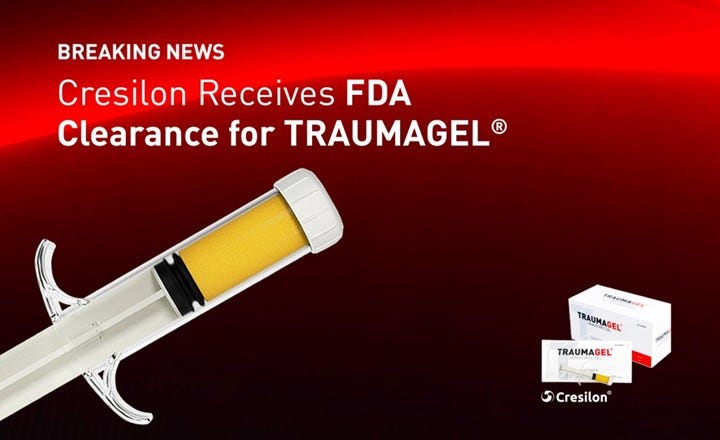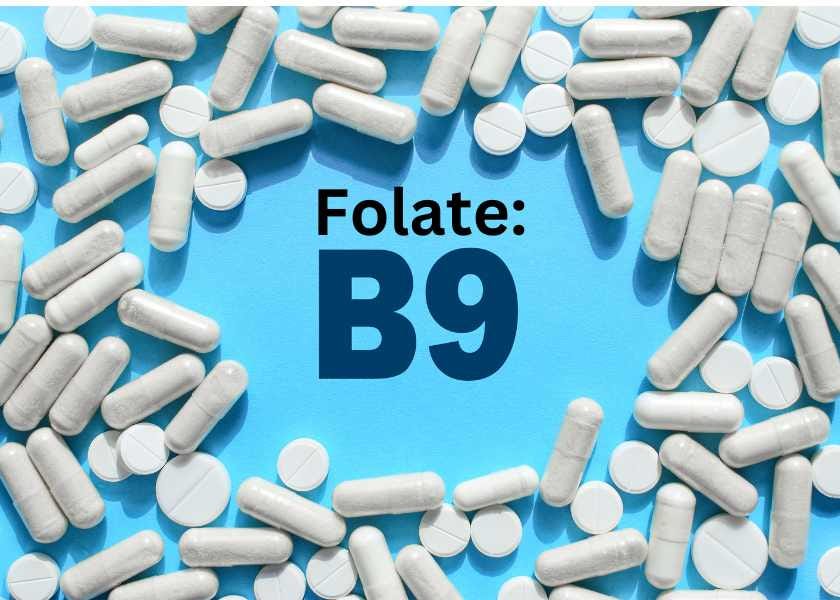August 25, 2024: Gel for wound trauma; new Parkinson's drug; opioid overdose med; appendicitis treatment; folate research; prostate cancer; closer look at 10 meds' negotiated prices; more!
New Drug Approvals
Wound Gel for Moderate to Severe Bleeding
Biotech company Cresilon said it received FDA approval for its Traumagel product, a gel that temporarily controls moderate to severe bleeding. Made of a proprietary plant (algae-based) formulation, the gel is supplied in a pre-filled syringe to be administered by medical professionals. A veterinary version of the product is sold under the name Vetigel and is used during surgical procedures. The company says it intends to develop and manufacture Traumagel to address the needs of the U.S. military, government health agencies, emergency medical services (“EMS”) systems, and medical professionals who routinely encounter traumatic wounds and need a solution to quickly and effectively stop and control severe bleeding.
The product instructions for use say Traumagel is not a wound closure device and must be removed within 24 hours. It is not to be used if the wound shows signs of infection or in immunocompromised patients.
https://cresilon.com/2024/08/15/cresilon-receives-fda-clearance-for-traumagel/

New Emergency Opioid Overdose Drug
The FDA approved Purdue Pharma’s emergency opioid overdose drug Zurnai (nalmefene injection) for patients age 12 and up. Critics say the approval is controversial not only because of the irony (Purdue Pharma is making money off an antidote to its own opioid-containing drugs that caused nationwide addiction and overdoses in the first place) but also because of potential safety concerns about the drug. Some medical doctors say that Zurnai (nalmefene) is more potent than naloxone, stays in the system longer, and can lead to dangerous reactions if the patient tries to block its effects by taking more opioid drugs. They argue that naloxone (Narcan brand name), which is available without a prescription and often given out free in communities, is safer and should be the first-line or even only antidote used. It is expected that Purdue will put pressure on the FDA to obtain over-the-counter approval for Zurnai.
https://filtermag.org/fda-zurnai-nalmefene-purdue/
FDA Press Release on Zurnai Approval
Extended Release Parkinson’s Combination Drug Approved
Amneal's CREXONT™ (carbidopa and levodopa) extended-release capsules were approved for the treatment of Parkinson’s disease and parkinsonism. While the ingredients in Crexont are not new, the longer-acting formula allows patients to take three doses a day instead of five and get the same therapeutic benefit. https://www.usf.edu/health/news/2024/fda_approves_parkinsons_treatment_based_on_usf_health_faculty_research.aspx
More on Crexont from Fierce Pharma.
Needle-Free Epinephrine for Severe Allergic Reaction
The U.S. Food and Drug Administration (FDA) approved ARA Pharma’s needle-free neffy (epinephrine) for treating severe allergic reactions in adults and children weighing 66 pounds (about 30 kg) or more. As the first nasal spray of its kind, neffy provides patients and their caregivers with an alternative to needle-based devices such as the EpiPen. ARA says that neffy (2 one-use spray devices) will be available to purchase in October 2024, at a price of $25 with insurance and $200 without.
https://www.fda.gov/news-events/press-announcements/fda-approves-first-nasal-spray-treatment-anaphylaxis
Third Biosimilar for Eylea Age-related Macular Degeneration Treatment
The FDA approved Sandoz’s “biosimilar”(or generic) Enzeevu (aflibercept) to treat wet or neovascular age-related macular degeneration (nAMD). Enzeevu is the third FDA-approved biosimilar to Eylea (aflibercept). Biocon Biologics’s Yesafili (aflibercept-jbvf) and Samsung Bioepis’ Opuviz (aflibercept-yszy) have also received FDA approval and are considered “interchangeable” with Eylea, a more marketable designation. A Sandoz spokesperson confirmed to Pharmaceutical Technology that its product does not yet have the “interchangeable” designation due to the still-pending exclusivity of other competitors.
https://www.pharmaceutical-technology.com/news/fda-approves-sandozs-enzeevu-as-eylea-biosimilar-saga-continues/
10 Common Drugs for Medicare Patients: Price Reductions
The long-awaited government-initiated price negotiations for ten popular and expensive brand name drugs taken by Medicare patients were revealed recently, but a closer examination of the details reveal fairly modest and short-lived cost savings for taxpayers. The treatments and drugs selected include:
Blood thinners: Eliquis and Xarelto (Eliquis and Xarelto ratings)
Diabetes: Januvia, Jardiance, Fiasp/NovoLog, Farxiga (Januvia, Jardiance, Novolog, Farxiga ratings)
Rheumatoid arthritis: Enbrel (Enbrel ratings)
Blood cancer: Imbruvica (Imbruvica ratings)
Heart failure: Entresto (also Farxiga) Entresto ratings
Psoriasis and Chron's: Stelara (Stelara ratings)
Many of the drugs are slated to go off-patent in 2024, 2025 or 2026, which means they will soon have generic competition either before or shortly after the discounted prices begin in 2025. Also, the comparison list prices quoted are misleading, since many already had preexisting "rebates" reducing the cost to the government, so the cost savings to government is closer to just 15% or so, according to Forbes. Nevertheless, patients (Medicare beneficiaries) may realize significant savings: Medicare recipients pay 25% of list price in the coverage phase of part D benefit, so since the new list price is lower, the cost to these Medicare patients will be lower. For instance, the cost for Eliquis will come down about $60 a month.
The next batch of negotiated prices will go into effect for 15 more drugs in 2027, followed by another 15 drugs in 2028 and 20 more in each subsequent year. Drugmakers have ongoing lawsuits to block this from happening.
https://www.forbes.com/sites/joshuacohen/2024/08/18/negotiated-drug-prices-will-help-medicare-beneficiaries-unclear-if-and-by-how-much-government-saves-and-industry-loses/
Research on Health Benefits of Folate in Older Age
A study by Texas A&M AgriLife Research scientists suggests that folate-enriched food or vitamins, while essential for some age groups, may not be helpful for older adults. To simulate the effects of folate (vitamin B-9) in older adults, the researchers cut folate from the diets of animal models (mice) at an age corresponding roughly to human middle-age. They found that folate-limited models had healthier metabolism and maintained higher energy and physical activity levels. The study was published in Life Science Alliance.
https://agrilifetoday.tamu.edu/2024/08/01/reduction-in-folate-linked-to-healthier-aging-in-animal-models/
Research on Prostate Cancer Drug Combination and Cardiovascular Risks
A study by National Health Service (NHS) and other U.K. researchers found that cardiovascular risks are doubled when standard androgen deprivation therapies (ADT) such as Lupron or Zoladex and androgen-receptor signaling inhibitors (ARSIs) such as Zytiga (abiraterone) or Erleada (apalutamide) or Xtandi (enzalutamide) are given together to prostate cancer patients. ARSIs are testosterone-blocking drugs that improve survival for men with prostate cancer.
However, this study is a "call to action in the medical community" according to the accompanying editorial opinion, noting that cardiovascular disease is the second leading cause of death among men with prostate cancer. Researchers conducted a systematic review of 24 clinical trials published between 2012 and 2024, with a combined total enrollment of 22,166 men ages 63 to 77. Diagnoses ranged across the prostate cancer spectrum, from nonmetastatic cancer with aggressive features to metastatic prostate cancer that no longer responded to ADT by itself. The results were published in JAMA Oncology.
https://www.medpagetoday.com/hematologyoncology/prostatecancer/110522
Research on Antibiotics vs. Surgery for Appendicitis
While antibiotics have been used since the 1950s to treat some cases of appendicitis, the "gold standard" treatment has nearly always been surgical removal of the appendix. But evidence has started to accumulate that for those who want to avoid surgery, a course of antibiotics may be a valid alternative. For those that try the antibiotic route (in milder cases or when the appendix hasn't actually ruptured), about 20 – 30% still may end up having to have the surgery. Read about the case of Audrey Gibson, who was 10 years old in 2015 when she developed a painful infection of her appendix and became one of the first patients enrolled in a trial of whether antibiotics are an effective first-line treatment for appendicitis.
https://www.msn.com/en-us/health/other/antibiotics-may-help-people-avoid-surgery-for-appendicitis/ar-AA1oXCNg#fullscreen

Medication Tips: Tension Headaches
Consumer Reports took a small poll and also looked at two studies to identify the best over-the-counter remedy for tension headaches. In a poll of 195 “X” users, they asked which med was used for tension headaches, and 48.7 percent said they took ibuprofen, 25.6 percent said acetaminophen, and 12.3 percent opted for aspirin. In a Bayer-funded (but unpublished) study comparing 200 mg of ibuprofen to 500 mg of aspirin, ibuprofen was more effective in decreasing headache intensity one hour after treatment. In a different study comparing ibuprofen with acetaminophen, people who took 400 mg of ibuprofen had better and faster pain relief than those who took 1,000 mg of acetaminophen. Ibuprofen is the winner! However, it’s not for everyone. Check this Consumer Reports article for more on the topic, including drug-free remedies for headaches.
https://www.consumerreports.org/health/headache/smarter-is-acetaminophen-or-ibuprofen-better-for-headaches-a2034947372/
Did you miss this month’s Drug Safety Updates? Check them here:
August Drug Safety Updates Part 1 (sent August 11)
August Drug Safety Updates Part 2 (sent today, August 25)
Visit our website at www.askapatient.com for ratings and reviews of prescription drugs and flu, covid, and shingles vaccines.

